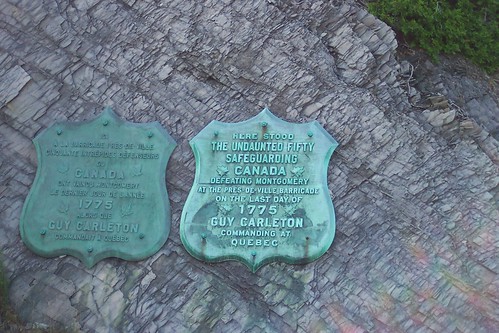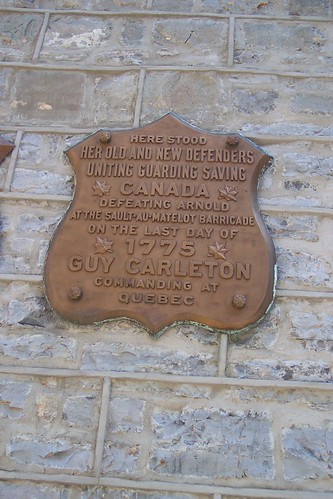The Battle of Quebec: December 31, 1775

Plaque erected in Quebec City marking the spot of American General Richard Montgomery’s death. “Here stood the Undaunted Fifty safeguarding Canada, defeating Montgomery at the Pres de Ville Barricade on the last day of 1775, Guy Carleton commanding at Quebec.”
Two hundred and thirty-five years ago tonight, American soldiers attacked the city of Quebec during a raging blizzard in a desperate attempt to capture Canada early in the Revolutionary War. Two separate American expeditions converged in the vicinity of Quebec City in December 1775. One led by General Richard Montgomery had moved up Lake Champlain from Albany, captured Montreal, and came to Quebec from the southwest. The other force, commanded by Benedict Arnold, had originated in Cambridge from the colonial forces gathered around Boston in the aftermath of Lexington and Concord and the Battle of Bunker Hill. George Washington had ordered Arnold to lead a force through the wilderness of Maine and approach Quebec from the southeast. Inland portions of Maine were so wild and unexplored, however, that both Washington nor Arnold grossly underestimated the distances involved. By the time they reached Canada, more than half of Arnold’s force had either died or turned back.
Because Canada had only become a British possession sixteen years earlier, the Americans hoped to recruit many French Canadian residents to their cause, but most either ignored the Americans or sided with the handful of British defenders of the city. Without a popular uprising and lacking artillery sufficient to overcome the walls of the city, Montgomery and Arnold decided that their only chance of success was to attack during a snowstorm. The opportunity arose on New Year’s Eve. Montgomery led his force from the west along the banks of the Saint Lawrence. Arnold would come in from the northeast, skirting the walls of the upper city. The Americans hoped to first capture the lower city and then move upward to the main portion of Quebec.
Montgomery’s force met with some initial success, but the snow obscured a heavily defended British-Canadian blockhouse. As Montgomery and his aides passed nearby, those inside fired a cannon which wiped out the American command group, causing the rest of the force to immediately retreat. Arnold fared little better. He made it into the lower city, but the narrow streets of the old town restricted his ability to maneuver. Arnold was shot in the foot and was evacuated by his men. Those who stayed behind were soon surrounded and surrendered.
In the aftermath of the battle, Arnold and the surviving Americans loitered around Quebec for some time, but the knowledge that no American reinforcements were en route and the certainty that a large British force would arrive from Europe as soon as the St Lawrence melted led Arnold to withdraw to the colonies. No further attempt to capture Canada was made by the Americans. Ironically, the 8,000-man British Army that arrived that spring was the same one that advanced down Lake Champlain in 1777 and ultimately surrendered to the Americans in the Saratoga campaign.
Below shows the plaque where the American force led by Benedict Arnold was stopped by the British and Canadian defenders. Here stood her old and new defenders uniting, guarding, saving Canada, defeating Arnold at the Sault-au-Matelot barricade on the last day of 1775, Guy Carleton commanding at Quebec

Many of my ancestors lived in Quebec at the time. Lots of Irish came in that way because it was way cheaper than going to the US direct. I think the word today would be “awkward”!!
An excellent historical novel detailing the march through Maine and the hardships endured is Arundel by Kenneth Roberts (author also of Northwest Passage, the 1940 film starring Spencer Tracy and a young Dr. Marcus Welby, Robert Young) . However my favorite Roberts historical novel is Oliver Wiswell, a history of the Revolution told from the perspective of the Tory sympathizers with George III and Great Britain
Paul, thanks for the book recommendations. I’ve seen the movie “Northwest Passage” and enjoyed it very much so I’ll check out the other novels by Roberts.
In one of those delightful ironies that make history such a fascinating topic to study, Northwest Passage does have a connection to this post about the American attack on Quebec. Northwest Passage was the story of Robert Rogers, the foremost American hero of the French and Indian War. Born in Methuen, Massachusetts, Rogers created “Rogers Rangers” during the war and established the “Rangers’ Creed” which is still used by Army Rangers today.
When the American Revolution began, Rogers still retained a captain’s commission in the British Army. Rogers was ambivalent about the Revolution and was really just looking for a job. The British weren’t interested so he sought to join the Americans. He was interviewed by George Washington who did not trust him and who had Rogers banished. Rogers ended up in the British Army. His one claim to fame in the Revolution is that it was he who captured Nathan Hale, the young American spy who said “I only regret that I have one life to give for my country” just before they hanged him.
Rogers died in debt and squalor in England and that’s the connection to this post. That’s exactly what happened to Benedict Arnold after he betrayed America and went over to the British side.
Dick, the sports teams at Methuen High School are called “The Rangers,” if my memory is correct. Does this go back to Robert Rogers and the local history connection there? Seems like it would. … Pause … Answered my own question with a quick check on Wikipedia …: “Methuen High School’s athletic teams play in the Merrimack Valley Conference. Their big rivals are the Andover Golden Warriors, Central Catholic Raiders of Lawrence, Massachusetts, and the Haverhill Hillies. On Thanksgiving Day, the American football team plays fellow Merrimack Valley foe, the Dracut Middies. The teams first met in a non-Thanksgiving Day game in 1935 and did not play again until the Thanksgiving series started in 1963. The school colors are blue and white and their mascot is the Ranger, named after Rogers’ Rangers, the precursor of the U.S. Army Rangers, which was founded by town resident Robert Rogers.”
I was not aware that Robert Rogers was from Methuen! I have both seen the movie and read the book. A quick Amazon search shows 2 recent biographies of Rogers plus 2 editions of his personal journal, one of which is illustrated and annotated. The Amazon-published review of “War on the Run” states (incorrectly?) that Rogers was born in “the wilds of New Hampshire” in 1731.
Interesting
i need the information of why did the war start